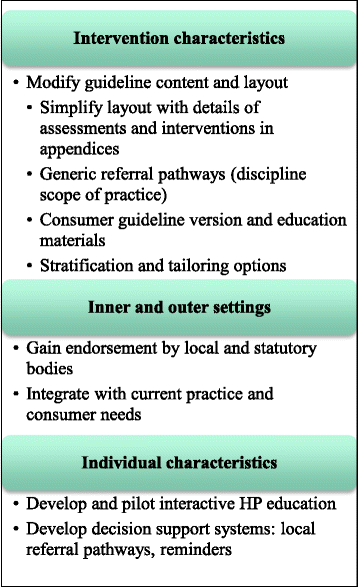Cancer related fatigue: implementing guidelines for optimal management
- PMID: 28720109
- PMCID: PMC5516360
- DOI: 10.1186/s12913-017-2415-9
Cancer related fatigue: implementing guidelines for optimal management
Abstract
Background: Cancer-related fatigue (CRF) is a key concern for people living with cancer and can impair physical functioning and activities of daily living. Evidence-based guidelines for CRF are available, yet inconsistently implemented globally. This study aimed to identify barriers and enablers to applying a cancer fatigue guideline and to derive implementation strategies.
Methods: A mixed-method study explored the feasibility of implementing the CRF guideline developed by the Canadian Association for Psychosocial Oncology (CAPO). Health professionals, managers and consumers from different practice settings participated in a modified Delphi study with two survey rounds. A reference group informed the design of the study including the surveys. The first round focused on guideline characteristics, compatibility with current practice and experience, and behaviour change. The second survey built upon and triangulated the first round.
Results: Forty-five health practitioners and managers, and 68 cancer survivors completed the surveys. More than 75% of participants endorsed the CAPO cancer related fatigue guidelines. Some respondents perceived a lack of resources for accessible and expert fatigue management services. Further barriers to guideline implementation included complexity, limited practical details for some elements, and lack of clinical tools such as assessment tools or patient education materials. Recommendations to enhance guideline applicability centred around four main themes: (1) balancing the level of detail in the CAPO guideline with ease of use, (2) defining roles of different professional disciplines in CRF management, (3) how best to integrate CRF management into policy and practice, (4) how best to ensure a consumer-focused approach to CRF management.
Conclusions: Translating current knowledge on optimal management of CRF into clinical practice can be enhanced by the adoption of valid guidelines. This study indicates that it is feasible to adopt the CAPO guidelines. Clinical application may be further enhanced with guideline adaptation, professional education and integration with existing practices.
Keywords: Applicability; Cancer-related fatigue; Consumer; Delphi study; Guideline; Health professionals; Implementation; Knowledge translation.
Conflict of interest statement
Ethics approval and consent to participate
Ethics approval was obtained for each stage of the project from the La Trobe University College of Science, Health and Engineering Human Ethics Committee (HREC: S15–144). All participants received an information statement and provided written or verbal consent to participate.
Consent for publication
Not applicable.
Competing interests
The authors declare that they have no competing interests.
Publisher’s Note
Springer Nature remains neutral with regard to jurisdictional claims in published maps and institutional affiliations.
Figures
References
-
- Berger AM, Mitchell SA, Jacobsen PB, Pirl WF. Screening, evaluation, and management of cancer-related fatigue: ready for implementation to practice? CA Cancer J Clin. 2015; doi:10.3322/caac.21268. - PubMed
MeSH terms
LinkOut - more resources
Full Text Sources
Other Literature Sources
Medical


